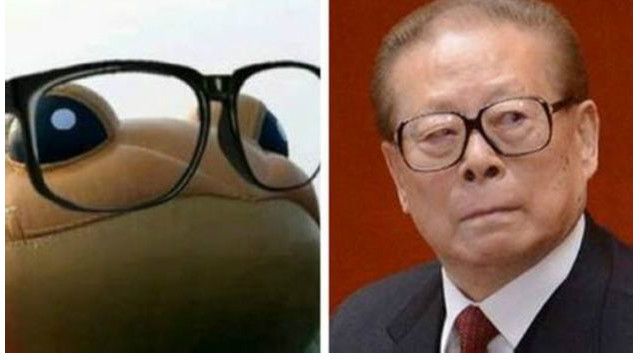The term “Toad worship” refers to the “worship” of Jiang Zemin, China’s top leader from 1989-2002. “Toad” is the nickname given to Jiang by Chinese netizens based on his appearance, while “Worship” can be taken as both ironic and heartfelt respect for him.

Most of the memes come from the video below.
Let me briefly introduce the background of the video. In late October 2000, Cheung Po-Wah, a Hongkong Journalist, was assigned to Beijing, together with Hong Kong Chief Executive Tung Chee-hwa for a routine meeting. During the interview, Cheung bluntly asked Jiang whether the Beijing government had already decided on Tung’s victory of the coming re-election, and Jiang, annoyed, rebuked her and her colleagues in English for being “too simple, sometimes naive”.
This video has suddenly become phenomenal around 2012-14, a time when smartphones and 4G communications had just become fully popular but censorship was not yet aided by advanced artificial intelligence so much so that a brand new subculture was born and it still has vigorous vitality today.
I am certainly a loyal one of the “fandom”, as evidenced by the fact that I can recite this dialogue (and mimic the accent and tone) quite easily,and can even correctly match the “lines” to the images even without subtitles.
In addition to his support of authoritarianism loyal to the party-state system, Jiang has come under considerable criticism for his persecution of specific religious and political groups, suppression of the pro-democracy movement, and crony capitalism, which many Chinese adults are well aware of. Despite his notoriety, Jiang has become a superstar on the Internet because of his unique personality.
Education is a strong suit for Jiang. As a mechanical engineer by training, Jiang graduated from Shanghai Jiaotong University (SJTU) during the golden age of Chinese university education (1920s-40s), then and now one of Asia’s top technical universities. He spent almost his entire political career in Shanghai before moving to Beijing as the head of the CCP and published some academic works while working. So you will see that Jiang speaks with more grace and confidence than Mao, who was known for his rudeness, or Xi, who can only read from scripts with his head down. A few years ago I showed a lot of Jiang’s videos to an Italian friend of mine who is very interested in Chinese politics, and he had no idea that there was ever a head of the Party who could give interviews and speeches in fluent English and Russian, and even play musical instruments and sing loudly in diplomatic occasions. I admit that some of the scenes look quite funny, and to this day I still occasionally look back at these classics when I’m down, and they really can make me feel better. Of course many of Jiang’s detractors describe him as a clown with a histrionic personality who always tries to get attention.
Jiang seems to be quite anti-traditional. Patriarchy is still one of the most important roots of Chinese culture, and most people still understand the relationship between the state and its citizens as that of ruler and subject. In such a political culture, any display of personal emotions by a leader is a huge taboo and would be seen as a desecration of the sacred authority. Thus by tradition, leaders are usually expected to have a permanent poker face, that’s to say, they should show more so-called “divinity” of themselves than their “humanity”, and they’d better make themselves look even less approachable than the Pope. After all, in the Chinese subconscious, the General Secretary of the CCP is in fact their secular as well as “religious” leader – but Jiang has little to do with these descriptions.
It is fair enough interpret such “worship” as a deconstruction of authority, which make us believe that our authoritarian government and those who represent them can also do things that can be laughed at for a thousand years because of mental breakdowns. If exaggerate a bit, we can also say it is a brave protest against conservatives like Mr. Stankface aka our great leader Chairman Xi!
Since blunt sarcasm is forbidden, we can still “worship”, right?
Reference:
[1] What is toad worship? Playful digital political engagement in China
[2] The politics of toad kings and fairy tales in China




Recent Comments